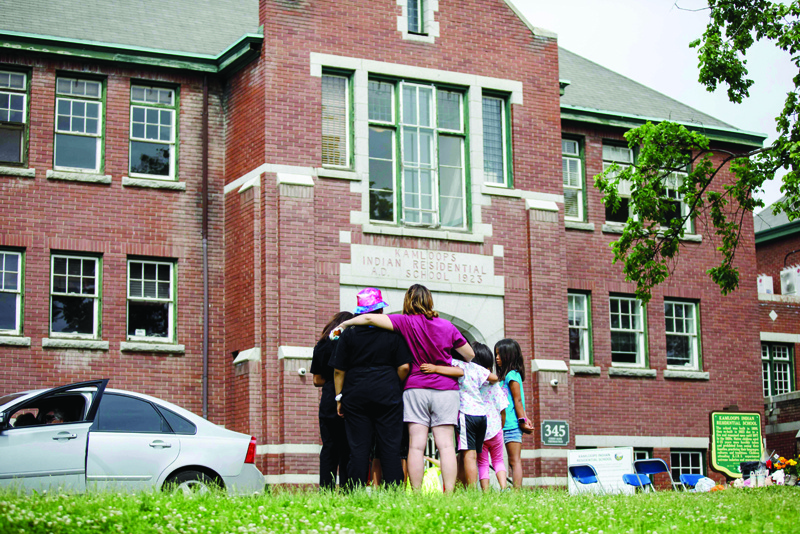 BRITISH COLUMBIA: Jennifer Nickel holds her daughters as they look up at the former Kamloops Indian Residential School where flowers and cards have been left as part of a growing makeshift memorial to honor the 215 children whose remains have been discovered buried near the facility, in Kamloops. - AFP
BRITISH COLUMBIA: Jennifer Nickel holds her daughters as they look up at the former Kamloops Indian Residential School where flowers and cards have been left as part of a growing makeshift memorial to honor the 215 children whose remains have been discovered buried near the facility, in Kamloops. - AFPOTTAWA: The Catholic Church has apologized "unequivocally" to Canada's indigenous peoples for a century of abuses at church-run residential schools set up by the government to assimilate children into the mainstream. But indigenous leaders are still awaiting a mea culpa from the pope himself. "We, the Catholic Bishops of Canada, express our profound remorse and apologize unequivocally," read a statement, in which they said they were "fully committed" to reconciliation.
The move follows recent discoveries, which convulsed Canada, of some 1,200 unmarked graves at three sites where indigenous children were forced to attend the schools. In total, some 150,000 Indian, Metis and Inuit children were enrolled from the late 1800s to the 1990s in 139 of the residential schools across Canada, spending months or years isolated from the families. It also comes less than a week before Canadians mark the first National Day for Truth and Reconciliation on September 30.
The solemn commemoration for the thousands of indigenous children who died or went missing from the schools was set by Canadian Prime Minister Justin Trudeau, who said in June that Canadians were "horrified and ashamed of how our country behaved." In the statement, the bishops said they "acknowledge the suffering experienced" by indigenous students and the "grave abuses" inflicted upon them, including "physical, psychological, emotional, spiritual, cultural, and sexual" mistreatment at the hands of headmasters and teachers.
"Many Catholic religious communities and dioceses participated in this system, which led to the suppression of Indigenous languages, culture and spirituality, failing to respect the rich history, traditions and wisdom of Indigenous Peoples," they said. "We also sorrowfully acknowledge the historical and ongoing trauma and the legacy of suffering and challenges faced by Indigenous Peoples that continue to this day."
'Cultural genocide'
A truth and reconciliation commission concluded the failed government policy amounted to "cultural genocide." Today, the residential school experiences are blamed for a high incidence of poverty, alcoholism and domestic violence, as well as high suicide rates, in Canada's indigenous communities. Searches for more possible grave sites using ground penetrating radar continue after discoveries in British Columbia and Saskatchewan provinces.
Meanwhile, tribes are trying to piece together old documents that might help identify the deceased in the unmarked graves and shed light on the fate of others who never returned home. The bishops committed to "providing documentation or records (requested by tribes) that will assist in the memorialization of those buried in unmarked graves."
Indigenous groups and leaders have also called for a papal apology for the Church's role in the residential schools, with backing from Trudeau who has said he personally implored Pope Francis to "make an apology to indigenous Canadians on Canadian soil." Indigenous leaders have said an apology from the church is welcomed, but it would be more meaningful coming from the pope himself. A delegation of Canadian indigenous peoples is scheduled to travel to the Vatican in December to meet with the pope. In the meantime, the bishops said they would work with the Vatican and indigenous leaders to try to schedule a papal visit to Canada "as part of this healing journey." - AFP









